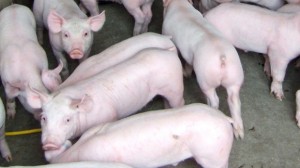 [1]
[1]There is no known treatment if pigs become infected with porcine epidemic diarrhea; prevention is the only tactic against the virus.
By Morgan Davy
BELLEVILLE – Local pig farmers need to take extreme precautions to save their herds from a deadly virus spreading quickly across the province, an industry official said Tuesday.
Mary Jane Quinn, manager of communications and consumer marketing at the pork-farmers’ organization Ontario Pork, said the threat of porcine epidemic diarrhea to local farmers is quickly increasing.
“Everyone is on high alert. Everyone has been told to heighten their biosecurity protocols. That means cleaning and disinfection protocols to be put in place at farm level and right up through the chain,” she said.
A fifth case of the virus in Ontario was confirmed on Saturday morning in the southwestern region of the province.
The symptoms include dehydration and diarrhea. The virus can affect all ages of swine but is typically fatal to young piglets, the Canadian Swine Health Board says.
Since the first diagnosis in Middlesex County on Jan. 22, four more farms have fallen victim.
Ontario’s Ministry of Agriculture and Food, along with Premier Kathleen Wynne, have repeatedly said humans cannot contract the disease. The virus also does not affect meat from the animals.
Quinn said the virus is transmitted through contact with manure. Colder weather provides perfect conditions for the bacteria that cause it to spread, because they can survive longer on clothes and boots, she said.
The only defence is to sterilize anything that may come into contact with the bacteria, she added.
In the United States the virus has been reported more than 20 states and killed an estimated 3 million pigs. But it has only recently migrated north.
The Canadian government is in the process of approving a vaccine that has been proven to help pigs build antibodies to fight off the virus, Quinn said, but it is a prevention method only. There is no known treatment for infected herds.
“They’re just looking at management at this point because there’s still a lot of uncertainty with this particular virus. Although there’s a vaccine, it’s still preliminary,” she said. “Everyone is just trying to do the things that are proven: the cleaning and disinfection to stay on top of it.”
It is ultimately up to individual farmers to do everything in their power to protect their herd, Quinn said.
“At the end of the day it’s up to the actual pork producer and their own business and the vet that they employ to work out what is best for their own operation.”